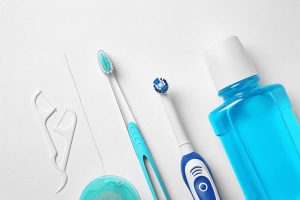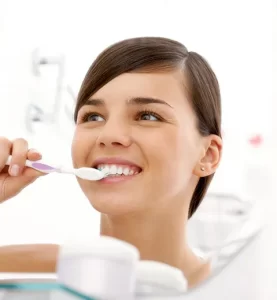Protecting Your New Crown: Tips for Lasting Dental Care
Getting a dental crown is a significant investment in your oral health, but the journey to a lasting smile doesn’t end when you leave the dentist’s chair. A beautiful, strong dental crown from our top Kirkland dentist can serve you for years, and its longevity is directly related to the care you give it.
At Dentiste, Dr. Roberts provides the guidance and support you need to maintain your smile. If you have questions about caring for your dental crown or need to schedule a follow-up, please call us at (425) 284-0515.
 Why Choose Dentiste for Dental Crown Maintenance?
Why Choose Dentiste for Dental Crown Maintenance?
At Dentiste, your dental crown is not just a restoration; it’s an investment in your long-term oral health. Dr. Roberts understands that the procedure is only the first step. The true value comes from a partnership built on trust and a shared commitment to dental crown maintenance. Dental crowns can be constructed from different materials, including porcelain, ceramic crowns, gold, and metal alloys, each offering unique benefits tailored to your needs.
- Education and Empowerment: Dr. Roberts and her team take the time to provide clear, easy-to-follow guidance on how to care for a dental crown. From demonstrating the proper way to brush and floss with a crown to discussing specific dietary considerations, we equip you with the knowledge needed to protect your restoration every day.
- Commitment to Your Longevity: Our goal is to give you a long-lasting dental crown. This begins with the initial procedure, where Dr. Roberts uses high-quality materials and precise techniques to create a durable dental crown with an excellent fit.
- A Warm and Welcoming Environment: We know that a dentist visit can feel daunting. Our Kirkland dental clinic is designed to be a calming and comfortable space where you feel at ease.
Importance of Regular Dental Crown Care
Here’s why regular dental crown care is so important, along with some maintenance tips :
- Prevents Decay on the Natural Tooth: The crown itself cannot get a cavity, but the natural tooth structure underneath it and around the margins is still vulnerable. Plaque and bacteria can accumulate at the gum line where the crown meets the tooth, leading to decay.
- Maintains Gum Health: The gums surrounding a crowned tooth need the same attention as those around your natural teeth. Failing to clean this area can lead to gingivitis (gum inflammation) and periodontal disease. Gum recession can also expose the margin of the crown, which can be aesthetically unappealing, particularly with porcelain-fused-to-metal crowns that may show a dark line.
- Increases Longevity: With proper care, a dental crown can last for 10-15 years or even longer. Brushing and flossing regularly, avoiding hard and sticky foods, and using a nightguard if you grind your teeth are all habits that extend the life of your crown and protect it from chipping or fracturing.
- Early Detection of Issues: Regular dental check-ups are critical for dental crown maintenance. During these visits, Dr. Roberts can inspect the crown for signs of wear, a poor fit, or damage. Proper maintenance of dental crowns can help prevent future complications that may lead to costly repairs or replacements.
Daily Habits for Dental Crown Longevity
Proper dental crown hygiene is not much different from the daily care you give to your natural teeth. The key is consistency and attention to detail.
- Brushing: Brushing at least twice a day is a fundamental part of caring for dental crowns. Use a soft-bristle toothbrush and a non-abrasive toothpaste. Pay close attention to the area where the crown meets the gumline, as this is a common place for plaque buildup.
- Flossing: Many people wonder how to brush and floss with a crown. The process is the same as with your natural teeth. Flossing is critical for cleaning the dental crown and the area between your teeth, removing plaque and food particles that brushing can miss.
Dietary Considerations for a Durable Dental Crown
To maintain a durable dental crown, it’s a good idea to be mindful of your eating habits as well as good oral hygiene practices. While a crown is incredibly strong, it is not indestructible. Knowing what to avoid with a dental crown is just as important as knowing what to eat. Avoid chewing on hard objects like ice or pens, which can damage your dental crown.
- Be Careful with Hard Foods: Hard candies, ice, and nuts can put excessive pressure on your crown and the underlying tooth, potentially causing a chip or fracture.
- Chewy Foods and Sticky Foods: Avoid chewing on very sticky foods like caramel or gum, as they can sometimes pull on the crown and loosen it. It’s also wise to avoid chewing on bones or other hard objects.
- Staining Foods (for porcelain crowns): If you have a porcelain crown, be aware that while the material is stain-resistant, the bonding cement around it can sometimes discolor over time. Limiting highly pigmented foods and beverages like coffee, red wine, and berries can help maintain a brighter smile.
Routine Dental Crown Maintenance and Check-ups
Your daily hygiene routine is your first line of defense, but a professional dental crown check-up is the next step in proper dental crown maintenance. Regular visits to a dentist near you are essential. During these appointments, Dr. Roberts will examine the crown to make sure it is still securely in place, check the gum tissue around it, and look for any signs of wear or damage. These check-ups help catch minor issues before they become major problems. After a dental crown procedure, it is important to follow proper aftercare guidelines to ensure the crown stays in place and your mouth heals properly.
Frequently Asked Questions
No, a special toothpaste for permanent crowns or temporary crowns isn’t necessary. A non-abrasive fluoride toothpaste is generally recommended, along with using a soft-bristle toothbrush. Avoid highly abrasive toothpastes that contain ingredients like baking soda, which can scratch the surface of your crown over time.
If your crown feels loose, it’s important to contact your dentist immediately. Do not try to re-cement it yourself. A loose crown can lead to decay or damage to the underlying tooth.
No, the crown itself is made of an inert material and cannot get a cavity. However, the tooth underneath the crown and the margin where the crown meets the tooth are still susceptible to tooth decay and gum disease. This is why good oral hygiene habits are crucial.
It’s normal to have some minor sensitivity or gum irritation in the days following the procedure. If the sensitivity persists or worsens, or if the gum tissue becomes red, swollen, or bleeds, contact our office for a check-up. You may experience discomfort or pain after a dental crown procedure and should take prescribed pain medication as directed.
Discover the Best Tooth Crown Care Tips With Dr. Roberts
Your smile is a source of joy and confidence, and it’s something worth protecting. You’ve already taken a powerful step by choosing to restore your tooth with a dental crown. Now, the rest of the journey is about maintaining that peace of mind. The small, consistent habits of good oral hygiene are an act of self-care that strengthens your smile for years to come.
We welcome patients in Redmond, Bellevue, and Woodinville to discover the comfort and security of our care. Your peace of mind is just a phone call away. Contact our Kirkland dental office at (425) 284-0515 to ensure your smile remains as healthy as it is beautiful.

